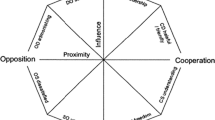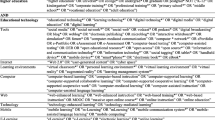Abstract
The present study examined changes in high school biology and technology education pedagogy during the first year of a three-year professional development (PD) program using the INSPIRES educative curriculum. The Next Generation Science Standards (NGSS) calls for the integration of science and engineering through inquiry-based pedagogy that shifts the burden of thinking from the teacher to the student. This call is especially challenging for teachers untrained in inquiry teaching and engineering or science concepts. The INSPIRES educative curriculum materials and PD provided a mechanism for teachers to transform their teaching to meet the NGSS challenges. This study followed a longitudinal triangulation mixed methods design. Selected lessons were video recorded, scored on the Reformed Teaching Observation Protocol (RTOP) rubric, and examined for qualitative trends. Year 1 results indicated that teachers had begun to transform their teaching and pointed to particular lessons within the INSPIRES curriculum that most facilitated the reform. Instructional practices of participants improved significantly as a result of the INSPIRES PD program and also aligned with previous, similar studies. These findings provide insights for rethinking the structure of professional development, particularly in the integrated use of an educative curriculum aligned with intended professional development goals.
Similar content being viewed by others
References
Amolins, M. W., Ezrailson, C. M., Pearce, D. A., Elliott, A. J., & Vitiello, P. F. (2015). Evaluating the effectiveness of a laboratory-based professional development program for science educators. Advances in Physiology Education, 39(4), 341–351.
Arias, A. M., Davis, E. A., Marino, J. C., Kademian, S. M., & Palincsar, A. S. (2016). Teachers’ use of educative curriculum materials to engage students in science practices. International Journal of Science Education, 38(9), 1504–1526.
Ball, D. L., & Cohen, D. K. (1996). Reform by the book: what is—or might be—the role of curriculum materials in teacher learning and instructional reform? Educational Research, 25, 6–8.
Blumenfeld, P. C., Soloway, E., Marx, R. W., Krajcik, J. S., Guzdial, M., & Palincsar, A. (1991). Motivating project-based learning: sustaining the doing, supporting the learning. Educational Psychologist, 26(3–4), 369–398.
Bryan, L. A., & Atwater, M. M. (2002). Teacher beliefs and cultural models: a challenge for science teacher preparation programs. Science Education, 86(6), 821–839.
Bryk, A. S., Gomez, L. M., & Grunow, A. (2011). Getting ideas into action: building networked improvement communities in education. In Frontiers in sociology of education (pp. 127–162). Dordrecht: Springer.
Cicchetti, D. V. (1994). Guidelines, criteria, and rules of thumb for evaluation normed and standardized assessment instruments in psychology. Psychology Assessment, 6(4), 284–290.
Coffey, A., & Atkinson, P. (1996). Making sense of qualitative data: complementary research strategies (pp. 54–82). Thousand Oaks: Sage Publications.
Cuban, L. (2013). Inside the black box of classroom practice: change without reform in American education. Cambridge: Harvard Education Press.
Darling-Hammond, L., & Mclaughlin, M. W. (1995). Policies that support professional development in an era of reform. Phi Delta Kappan, 76, 597–604.
Davis, E., & Krajcik, J. (2005). Designing educative curriculum materials to promote teacher learning. Educational Researcher, 34(3), 3–14.
Desimone, L. M. (2009). Improving impact studies of teachers' professional development: toward better conceptualizations and measures. Educational Research, 38(3), 181–199.
Enderle, P., Dentzau, M., Roseler, K., Southerland, S., Granger, E., Hughes, R., & Saka, Y. (2014). Examining the influence of RETs on science teacher beliefs and practice. Science Education, 98(6), 1077–1108.
Erduran, S., Simon, S., & Osborne, J. (2004). TAPping into argumentation: developments in the application of Toulmin’s argument pattern for studying science discourse. Science Education, 88(6), 915–933.
Faber, A., & Mazlish, E. (2008). How to talk so kids can learn. New York: Simon and Schuster.
Fishman, E. J., Borko, H., Osborne, J., Gomez, F., Rafanelli, S., Reigh, E., Tseng, A., Million, S., & Berson, E. (2017). A practice-based professional development program to support scientific argumentation from evidence in the elementary classroom. Journal of Science Teacher Education, 28(3), 222–249.
Knaggs, C., & Schneider, R. (2012). Thinking like a scientist: using vee-maps to understand process and concepts in science. Research in Science Education, 42(4), 609–632.
Krajcik, J. S., & Blumenfeld, P. C. (2006). Project-based learning (pp. 317–334).
Krajcik, J. (2015). Project-based science: engaging students in three-dimensional learning. The Science Teacher, 82(1), 25.
Jennings, P. A., & Greenberg, M. T. (2009). The prosocial classroom: teacher social and emotional competence in relation to student and classroom outcomes. Review of Educational Research, 79(1), 491–525.
Lotter, C., Rushton, G., & Singer, J. E. (2013). Teacher enactment patterns: how can we help move all teachers to reform-based inquiry practice through professional development? Journal of Science Teacher Education, 24, 1263–1291.
Loucks-Horsley, S., Stiles, E., Mundry, S., Love, N., & Hewson, P. (2010). Designing professional development for teachers of science and mathematics (3rd ed.). Thousand Oaks: Corwin.
Luft, J. A., & Hewson, P. W. (2014). Research on teacher professional development programs in science. Handbook of Research on Science Education, 2, 889–909.
MacIsaac, D., Sawada, D., & Falconer, K. (2001). Using the Reformed Teaching Observation Protocol (RTOP) as a catalyst for self-reflective change in secondary science teaching. Paper presented at the annual meeting of the American Educational Research Association, Seattle, WA.
Marco-Bujosa, L. M., McNeill, K. L., González-Howard, M., & Loper, S. (2017). An exploration of teacher learning from an educative reform-oriented science curriculum: case studies of teacher curriculum use. Journal of Research in Science Teaching, 54(2), 141–168.
Marx, R. W., Blumenfeld, P. C., Krajcik, J. S., Fishman, B., Soloway, E., Geier, R., & Tal, R. T. (2004). Inquiry-based science in the middle grades: assessment of learning in urban systemic reform. Journal of Research in Science Teaching, 41(10), 1063–1080.
McAleer, S. D. (2008). Professional growth through mentoring: a study of experienced mathematics teachers participating in a content-based online mentoring and induction program. Dissertation Abstracts International-A, 69 (08).
McNeill, K. L., González-Howard, M., Katsh-Singer, R., & Loper, S. (2017). Moving beyond pseudoargumentation: teachers’ enactments of an educative science curriculum focused on argumentation. Science Education, 101(3), 426–457.
McNeill, K. L., & Knight, A. M. (2013). Teachers’ pedagogical content knowledge of scientific argumentation: the impact of professional development on K–12 teachers. Science Education, 97(6), 936–972.
National Research Council. (2012). A framework for K-12 science education: practices, crosscutting concepts, and core ideas. Washington, DC: National Academies Press Retrieved from http://www.nap.edu/catalog.php?record_id=13165.
Next Generation Science Standards. (2013). Next Generation Science Standards. [Website]. Washington, DC: National Research Council, National Science Teachers Association, & American Association for the Advancement of Science Retrieved from http://www.nextgenscience.org/.
Osborne, J., Erduran, S., & Simon, S. (2004). Enhancing the quality of argumentation in school science. Journal of Research in Science Teaching, 41(10), 994–1020.
Piburn, M., & Sawada, D. (2000). Reformed teaching observation protocol (RTOP): reference manual (ACEPT technical report IN00-3). Tempe: Arizona State University, Arizona Collaborative for Excellence in the Preparation of Teachers.
Pringle, R. M., Mesa, J., & Hayes, L. (2017). Professional development for middle school science teachers: does an educative curriculum make a difference? Journal of Science Teacher Education, 28(1), 57–72.
Reeves, R., & Ross, J. (2010). AC 2010–1952: a novel approach to professional development. American Society for Engineering Education, Conference Proceedings, 15, 1.
Reiser, B. J. (2014). Designing coherent storylines aligned with NGSS for the K-12 classroom. Paper presented at the Professional Development Institute of the National Science Education Leadership Association, Boston, MA. Retrieved from https://www.academia.edu/6884962/Designing_Coherent_Storylines_Aligned_with_NGSS_for_the_K-12_Classroom. Accessed 22 June 2017.
Remillard, J. T. (2000). Can curriculum materials support teachers’ learning? Two fourth-grade teachers’ use of a new mathematics text. The Elementary School Journal, 100(4), 331–350.
Richmond, G., Parker, J. M., & Kaldaras, L. (2016). Supporting reform-oriented secondary science teaching through the use of a framework to analyze construction of scientific explanations. Journal of Science Teacher Education, 27(5), 477–493.
Roseman, J. E., Fortus, D., Krajcik, J., & Reiser, B. J. (2015). Curriculum materials for Next Generation Science Standards: what the science education research community can do. In NARST Annual International Conference, Chicago, IL.
Roseman, J. E., Herrmann-Abell, C. F., & Koppal, M. (2017). Designing for the Next Generation Science Standards: educative curriculum materials and measures of teacher knowledge. Journal of Science Teacher Education, 28(1), 111–141.
Ross, J., Bayles, T., & Singer, J. (2015). The inspires curriculum. In C. Sneider (Ed.), The go-to guide for engineering curricula, grades 9–12 (pp. 19–30). London: SAGE Publications Ltd. https://doi.org/10.4135/9781483388373.n3.
Rushton, G., Lotter, C., & Singer, J. (2011). Chemistry teachers’ emerging expertise in inquiry teaching: the effect of an authentic professional development model on beliefs and practice. Journal of Science Teacher Education, 22, 23–52.
Saderholm, J., Ronau, R. N., Rakes, C. R., Bush, S. B., & Mohr-Schroeder, M. (2016). The critical role of a well-articulated conceptual framework to guide professional development: an evaluation of a state-wide two-week program for mathematics and science teachers. Professional Development in Education. https://doi.org/10.1080/19415257.2016.1251485.
Schneider, R. M., Krajcik, J., & Blumenfeld, P. (2005). Enacting reform-based science materials: the range of teacher enactments in reform classrooms. Journal of Research in Science Teaching, 42(3), 283–312.
Singer, J., Marx, R. W., Krajcik, J., & Clay Chambers, J. (2000). Constructing extended inquiry projects: curriculum materials for science education reform. Educational Psychologist, 35(3), 165–178.
Singer, J., Lotter, C., Feller, R., & Gates. (2011). Exploring a model of situated professional development: impact on classroom practice. Journal of Science Teacher Education, 22(3), 203–227.
Singer, J. E., Ross, J. M., & Jackson-Lee, Y. (2016). Professional Development for the Integration of Engineering in High School STEM Classrooms. Journal of Pre-College Engineering Education Research, 6(1), 30–44.
Southerland, S. A., Nadelson, L., Sowell, S., Saka, Y., Kahveci, M., & Granger, E. M. (2012). Measuring one aspect of teachers’ affective states: development of the science teachers’ pedagogical discontentment scale. School Science and Mathematics, 112(8), 483–494.
Spradley, J. P. (1980). Participant observation. Orlando: Harcourt Brace Jovanovich College Publishers.
Sztajn, P. (2011). Research commentary: standards for reporting mathematics professional development in research studies. Journal for Research in Mathematics Education, 42(3), 220–236.
Willis, M. B. (2018). Examination of novice science teachers' use of project-based instructional strategies (Doctoral dissertation, University of Massachusetts Lowell).
Acknowledgements
We wish to thank the teachers, administrators, and program staff of our partner school district for their time and efforts in this study. The following UMBC students assisted in the collection of classroom recordings: Abby Singer, Ahmed Al-Salihi, Goureesh Paranjpe, Garrett Bockmiller, Marcus Foster, and Ekaterina DiBenedetto.
Funding
This project was funded by a Discovery Research K–12 National Science Foundation grant (DRL 1418183).
Author information
Authors and Affiliations
Corresponding author
Ethics declarations
Conflict of Interest
The authors declare that they have no conflict of interest.
Ethical Approval
All procedures performed in studies involving human participants were in accordance with the ethical standards of the institutional and/or national research committee and with the 1964 Helsinki Declaration and its later amendments or comparable ethical standards.
Informed Consent
Informed consent was obtained from all individual participants included in the study.
Rights and permissions
About this article
Cite this article
Williams, T., Singer, J., Krikorian, J. et al. Measuring Pedagogy and the Integration of Engineering Design in STEM Classrooms. J Sci Educ Technol 28, 179–194 (2019). https://doi.org/10.1007/s10956-018-9756-y
Published:
Issue Date:
DOI: https://doi.org/10.1007/s10956-018-9756-y




